
Ecological and Psychological Study
Deep Ecology is defined as:
- a philosophy based on our sacred relationship with Earth and all beings
- an international movement for a viable future
- a path for self realisation
- a compass for daily action
Deep Ecology Supports:
- continuing inquiry into the appropriate human roles on our planet
- root cause analysis of unsustainable practices
- reduction of human consumption
- conservation and restoration of ecosystems
- a life of committed action for Earth
Arne Naess’s original definition of ecosophy is:
"By an ecosophy I mean a philosophy of ecological harmony or equilibrium. A philosophy as a kind of sofia (or) wisdom, is openly normative, it contains both norms, rules, postulates, value priority announcements and hypotheses concerning the state of affairs in our universe. Wisdom is policy wisdom, prescription, not only scientific description and prediction. The details of an ecosophy will show many variations due to significant differences concerning not only the ‘facts’ of pollution, resources, population, etc. but also value priorities."
]]>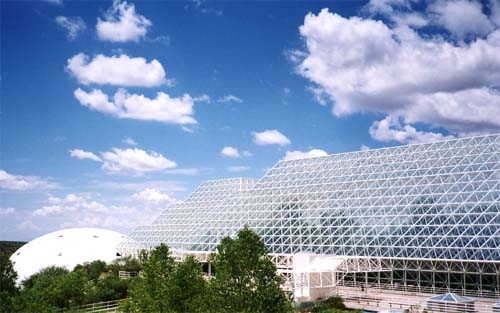
Biosphere 2 is a 3.15-acre (12,700 m2)[1] structure originally built to be an artificial, materially-closed ecological system in Oracle, Arizona (USA) by Space Biosphere Ventures, a joint venture whose principal officers were John P. Allen, inventor and Executive Director, and Margret Augustine, CEO. Constructed between 1987 and 1991, it was used to explore the complex web of interactions within life systems in a structure that included five areas based on natural biomes and an agricultural area and human living/working space to study the interactions between humans, farming and technology with the rest of nature.[2] It also explored the possible use of closed biospheres in space colonization, and allowed the study and manipulation of a biosphere without harming Earth's. The name comes from Earth’s biosphere, Biosphere 1, Earth's life system and the only biosphere currently known. Funding for the project came primarily from the joint venture’s financial partner, Ed Bass' Decisions Investment, and cost $200 million from 1985 to 2007, including land, support research greenhouses, test module and staff facilities.
]]>
Exploring, as part of his schedule in the United Arab Emirates (UAE), Zayed University and Masdar City erected as the world’s first ecological city, President Gül shared his happiness with being the first Turkish President to pay an official visit to the UAE in years.
Welcomed by the Higher Education and Scientific Researches Minister of the UAE, Sheikh Nahyan bin Mubarak al Nahyan upon his arrival at Zayed University, President Gül, after chatting with the Rector, Deans and a group of students, was informed about the university and its activities by the Rector. He also conducted a teleconference talk with students of Turkey’s Bilkent University.
]]>The History of Hydroponics
The word hydroponics comes from two Greek words, "hydro" meaning water and "ponics" meaning labor. The concept of soilless gardening or hydroponics has been around for thousands of years. The hanging Gardens of Babylon and The Floating Gardens of China are two of the earliest examples of hydroponics. Scientist started experimenting with soil less gardening around 1950. Since then other countries, such as Holland, Germany, and Australia have used hydroponics for crop production with amazing results.

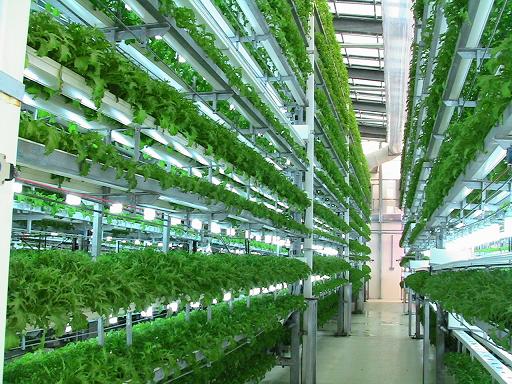

The Benefits of Hydroponics
Hydroponics is proved to have several advantages over soil gardening. The growth rate on a hydroponic plant is 30-50 percent faster than a soil plant, grown under the same conditions. The yield of the plant is also greater. Scientist believe that there are several reasons for the drastic differences between hydroponic and soil plants. The extra oxygen in the hydroponic growing mediums helps to stimulate root growth. Plants with ample oxygen in the root system also absorb nutrients faster. The nutrients in a hydroponic system are mixed with the water and sent directly to the root system. The plant does not have to search in the soil for the nutrients that it requires. Those nutrients are being delivered to the plant several times per day. The hydroponic plant requires very little energy to find and break down food. The plant then uses this saved energy to grow faster and to produce more fruit. Hydroponic plants also have fewer problems with bug infestations, funguses and disease. In general, plants grown hydroponically are healthier and happier plants.
Hydroponic gardening also offers several benefits to our environment. Hydroponic gardening uses considerably less water than soil gardening, because of the constant reuse the nutrient solutions. Due to lack of necessity, fewer pesticides are used on hydroponic crops. Since hydroponic gardening systems use no topsoil, topsoil erosion isn't even an issue. Although, if agricultural trends continue to erode topsoil and waste water, hydroponics may soon be our only solution.
]]> Arne Dekke Eide Næss (27 January 1912 – 12 January 2009) was the founder of deep ecology.[2] He was the youngest person to be appointed full professor at the University of Oslo.
Arne Dekke Eide Næss (27 January 1912 – 12 January 2009) was the founder of deep ecology.[2] He was the youngest person to be appointed full professor at the University of Oslo.
Næss cited Rachel Carson's 1962 book Silent Spring as being a key influence in his vision of deep ecology. Næss combined his ecological vision with Gandhian nonviolence and on several occasions participated in direct action. In 1970, together with a large number of demonstrators, he chained himself to rocks in front of Mardalsfossen, a waterfall in a Norwegian fjord, and refused to descend until plans to build a dam were dropped. Though the demonstrators were carried away by police and the dam was eventually built, the demonstration launched a more activist phase of Norwegian environmentalism[3]. In 1958, Arne Næss founded the interdiciplinary journal of philosophy Inquiry.
Næss had been a minor political candidate for the Norwegian Green Party.[4]
Næss was a noted mountaineer, who in 1950 led the expedition that made the first ascent of Tirich Mir (7,708 m). The Tvergastein hut in the Hallingskarvet massif played an important role in Næss' life.
Philosophy
Arne Næss' main philosophical work from the 1950s was entitled "Interpretation and Preciseness". This was an application of set theory to the problems of language interpretation, extending the work of such logicians as Leonhard Euler, and semanticists such as Charles Kay Ogden in The Meaning of Meaning. A simple way of explaining it is that any given utterance (word, phrase, or sentence) can be considered as having different potential interpretations, depending on prevailing language norms, the characteristics of particular persons or groups of users, and the language situation in which the utterance occurred. These differing interpretations are to be formulated in more precise language represented as subsets of the original utterance. Each subset can, in its turn, have further subsets (theoretically ad infinitum). The advantages of this conceptualisation of interpretation are various. It enables systematic demonstration of possible interpretation, making possible evaluation of which are the more and less "reasonable interpretations". It is a logical instrument for demonstrating language vagueness, undue generalisation, conflation, pseudo-agreement and effective communication.
Næss developed a simplified, practical textbook embodying these advantages, entitled Communication and Argument, which became a valued introduction to this pragmatics or "language logic", and was used over many decades as a sine qua non for the preparatory examination at the University of Oslo, later known as "Examen Philosophicum" ("Exphil").
]]>Arne Næss and George Sessions
Basic Principles of Deep Ecology

In April 1984, during the advent of Spring and John Muir’s birthday, George Sessions and Arne Næss summarized fifteen years of thinking on the principles of deep ecology while camping in Death Valley, California. In this great and special place, they articulated these principles in a literal, somewhat neutral way, hoping that they would be understood and accepted by persons coming from different philosophical and religious positions.
Readers are encouraged to elaborate their own versions of deep ecology, clarify key concepts and think through the consequences of acting from these principles.
by Alan Drengson
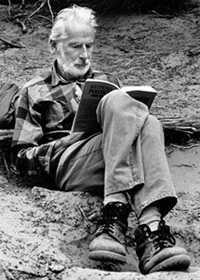
In 1973, Norwegian philosopher and mountaineer Arne Naess introduced the phrase “deep ecology” to environmental literature. Environmentalism had emerged as a popular grassroots political movement in the 1960s with the publication of Rachel Carson's book Silent Spring. Those already involved in conservation and preservation efforts were now joined by many others concerned about the detrimental environmental effects of modern industrial technology. The longer-range, older originators of the movement included writers and activists like Henry David Thoreau, John Muir and Aldo Leopold; more mainstream awareness was closer to the “wise-use” conservation philosophy pioneered by Gifford Pinchot.
In 1972, Naess made a presentation in Bucharest at the Third World Future Research Conference. In his talk, he discussed the longer-range background of the ecology movement and its concern with an ethic respecting nature and the inherent worth of other beings. As a mountaineer who had climbed all over the world, Naess had enjoyed the opportunity to observe political and social activism in diverse cultures. Both historically and in the contemporary movement, Naess saw two different forms of environmentalism, not necessarily incompatible with each other. One he called the “long-range deep ecology movement” and the other, the “shallow ecology movement.” The word “deep” in part referred to the level of questioning of our purposes and values when arguing in environmental conflicts. The “deep” movement involves deep questioning, right down to fundamental root causes. The short-term, shallow approach stops before the ultimate level of fundamental change, often promoting technological fixes (e.g. recycling, increased automotive efficiency, export-driven monocultural organic agriculture) based on the same consumption-oriented values and methods of the industrial economy. The long-range deep approach involves redesigning our whole systems based on values and methods that truly preserve the ecological and cultural diversity of natural systems.
]]>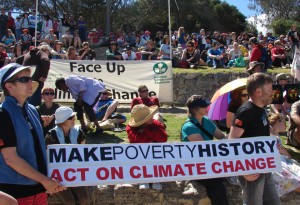
The science of climate change and human responsibility, the economics of addressing the problem, the justice dimension and, even, implications for North-South relations have all received substantial exposure in public debate and specialized technical, policy, and academic literatures. We also hear about the imperative to “climate-proof” society, the poor, and even the state. Occasionally we are told the “right political framework” is needed, usually meaning an improvement on the Kyoto Protocol and national legislation for regulating energy use.
A surprising omission is a balanced inquiry into what climate change and its effects mean for democratization, and what democratization could mean for mitigating greenhouse gas emissions and climate adaptation. Democratization here means movement toward something like actually existing liberal democracy, present in many countries, not theoretical models of deliberative democracy, radical participatory democracy, or “eco-democracy”. Just as global warming has become headline news, so another but more celebrated phenomenon of recent times has been a wave of democratization, starting in southern Europe in the 1970s, subsequently embracing Latin America, Central and Eastern Europe, and sizeable parts of Africa and Asia, too. Hardly less eye-catching, however, is the wave’s recent slowing to a halt and, by some accounts, partial retreat.
John Bellamy Foster interviewed by Aleix Bombila
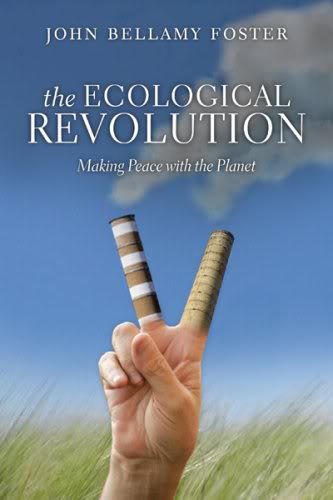 John Bellamy Foster is editor of the US socialist journal Monthly Review and author of Marx's Ecology and The Ecological Revolution. Aleix Bombila writes for En Lucha (Spain). This interview first appeared in English at MRZine.
John Bellamy Foster is editor of the US socialist journal Monthly Review and author of Marx's Ecology and The Ecological Revolution. Aleix Bombila writes for En Lucha (Spain). This interview first appeared in English at MRZine.
En Lucha: In your book Marx's Ecology you argue that Marxism has a lot to offer to the ecologist movement. What kind of united work can be established between Marxists and ecologists?
John Bellamy Foster: I think it is important to recognise that Marxists and ecologists are not entirely different groups. Of course it is true that there have been Reds who have been anti-ecological and Greens who have been anti-Marxist. But it is not uncommon for the two to overlap, and increasingly to converge. Many socialists are environmentalists and many environmentalists are socialists. Indeed, there is a sense in which Marxism and ecology, both classically and today, lead to the same conclusion. For Marx, the goal was the creation of a society in which the metabolic relation between humanity and nature (i.e. production) was rationally regulated by the associated producers. The original title of my book that you refer to was supposed to be Marx and Ecology, but I changed it to Marx's Ecology because of the depth of Marx's ecological conceptions.
I would argue that a critical Marxist approach, especially in our time, requires an ecological worldview, while a critical human ecology requires an anti-capitalist and ultimately socialist orientation (i.e., a Marxist one). In terms of united work that Marxists and ecologists can share, I would say social justice and environmental sustainability: saving humanity and saving the Earth. You can't expect to achieve one without the other, and neither is possible under the existing system.
Probably the strongest single voice for an ecological relation in the world today is Evo Morales, the socialist (and Indigenous) president of Bolivia. After the failed Copenhagen conference on climate change, Fidel Castro said that we used to think we were in a struggle simply to determine the society of the future, but we now know we are in a struggle for survival. We have reached a point where historical materialists are taking global leadership in defining the ecological needs of humanity.
The struggle against climate change looks kind of abstract at first sight. How can we organise campaigns against climate change with a real impact? Who should promote them?